The Psychology of Money Explained

The Psychology of Money" by Morgan Housel explores how human psychology influences financial decisions and offers insights on building wealth and achieving financial contentment. Here are the key takeaways:
Emotional Factors in Finance
Housel emphasizes that financial decisions are often driven by emotions rather than pure logic. Understanding our own psychological biases is crucial for effective money management.
The Power of Patience and Compounding
The book highlights the importance of patience and the power of compounding in building wealth over time. Housel illustrates these principles through compelling stories and examples.
Luck and Risk
A significant portion of financial outcomes can be attributed to luck and risk. People tend to underestimate the role of luck while overestimating their ability to control outcomes.
Saving and Frugality
Housel stresses the importance of living within one's means and prioritizing saving. He encourages readers to make conscious spending choices and adapt to changing circumstances.
Expert Predictions and Personal Narratives
The book challenges the reliability of expert financial predictions and explores how personal narratives about money, success, and happiness can impact financial decisions.
Key Lessons
Be reasonable rather than purely rational in financial decisions
Focus on what helps you "sleep at night" financially
Beware of lifestyle inflation as income increases
Maintain a balance between optimism about the future and caution about risks
Recognize that everyone has unique experiences with money and the economy
"The Psychology of Money" offers valuable insights into human behavior in finance, practical advice on saving and investing, and encourages readers to reconsider their attitudes towards money. It's highly recommended for anyone seeking to improve their financial mindset and decision-making
Emotional Factors in Finance
Housel emphasizes that financial decisions are often driven by emotions rather than pure logic. Understanding our own psychological biases is crucial for effective money management.
The Power of Patience and Compounding
The book highlights the importance of patience and the power of compounding in building wealth over time. Housel illustrates these principles through compelling stories and examples.
Luck and Risk
A significant portion of financial outcomes can be attributed to luck and risk. People tend to underestimate the role of luck while overestimating their ability to control outcomes.
Saving and Frugality
Housel stresses the importance of living within one's means and prioritizing saving. He encourages readers to make conscious spending choices and adapt to changing circumstances.
Expert Predictions and Personal Narratives
The book challenges the reliability of expert financial predictions and explores how personal narratives about money, success, and happiness can impact financial decisions.
Key Lessons
Be reasonable rather than purely rational in financial decisions
Focus on what helps you "sleep at night" financially
Beware of lifestyle inflation as income increases
Maintain a balance between optimism about the future and caution about risks
Recognize that everyone has unique experiences with money and the economy
"The Psychology of Money" offers valuable insights into human behavior in finance, practical advice on saving and investing, and encourages readers to reconsider their attitudes towards money. It's highly recommended for anyone seeking to improve their financial mindset and decision-making

